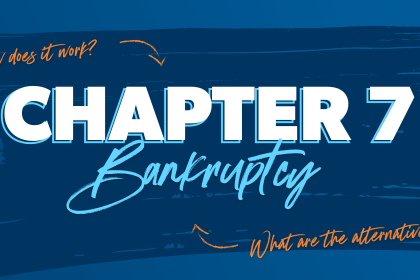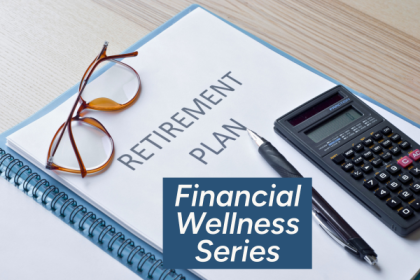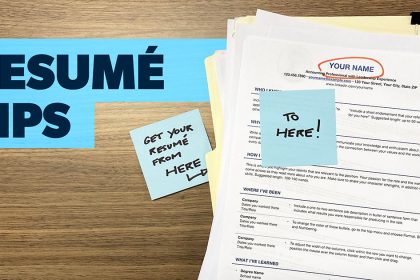With the tragic fire that occurred in Lahaina, Maui, hurricanes ripping through Florida yearly, and now the devastating Southern California fires, it’s important to review your home insurance policy and understand what it does and does not cover. You also need to have contingency plans in case your house burns down.
If you have not done so already, call your home insurance company to review your coverage details. You don’t want to be caught underinsured in case the worst happens.
In 2017, a Financial Samurai reader named EJ lost his home to the Tubbs Fire in Northern California. The fire was started by a private electrical system that ended up destroying 5,643 structures.
Luckily, he and his family were not hurt. I asked him to share his experience as well as what he learned dealing with the home insurance company.
A Fire That Came Out Of Nowhere
In 2017, we were living a good doctor’s life. A $1.2 million dollar home with a killer sunset view. Life was wonderful, but I was still quite stressed given I had mortgage and student debt. I had the kind of stress that affected me not only internally, but also externally. Affecting both work and relationship with my wife.
It was crazy to think that stress and a mortgage can be that powerful, but it was. In fact, I would walk around my home and think about how we had about 1,000 square foot of home more than we needed. It was 3,300 square foot and I determined that 2,000 to 2,500 square feet were a much better home size for us.
But here we sat, 11 months after buying a big home with unnecessary financial stress. Then overnight… POOF! It all went up in a flash.
Someone knocked on our door at 2 am waking us up. We left with our lives and health, although not much more. Others were not as fortunate and I have seen and felt the impact of those losses in our community. So I write this post knowing how lucky we are. And I am thankful for that.
Key points from the post:
- Why being a homeowner may be better than being a renter when disaster strikes
- How home insurance can actually make you much wealthier
- Know exactly what is covered under your home insurance plan
- Itemize everything in a spreadsheet and a picture catalog
- It may be better to have a complete loss rather than partial damage
Breaking Down A Home Insurance Policy
Here’s a home insurance primer on what is important when purchasing a policy. We lost our home, but by being well insured we are covered for not only our possessions and rebuilding, but also for our rental.
After the fires, both home prices (for sale) and rental prices actually skyrocketed. This was an unexpected surprise. But it was classic market supply and demand with a steroid boost of large amounts of insurance money.
That is why Loss of Use Coverage is so important and the first thing we talk about today.
Loss Of Use Coverage In A Home Insurance Policy
Coverage D: Loss of use and rental
In the land of fire and mass chaos, owning is better than renting (seems counterintuitive, but true). I talked to many people who were renters who were evicted since the fire. The landlords asked their tenants to leave so that either the landlord or one of their family/friends who lost a home could move in.
This put tenants in a bad position because now they were stuck in a town with a housing shortage and now higher prices. They had no choice, either pay more for a similar rental in town or move further out of town. Plus, unlike those who were insured and lost their home, tenants being evicted had little no insurance to help them through this.
Many Owners With Insurance Actually Came Out Fine
For owners, the situation was better, but it was only as good as the home owners insurance purchased.
I was well insured. My insurance paid for my rental up to two years because the Tubbs Fire was a Federally declared disaster. If it was just a run of the mill house fire, I would still be covered for 1 year. There was no monetary limit to my rental. Insurance covers an equivalent rental to my home.
So I was able to get a nice rental and not worry about the monthly rent. While insurance paid a lot for my rental, it still was not as much as one friend who had his home insurance pay $34K a month! On the other end is one of my friends, who had a maximum cap of $14,000 for her rental. That means that her insurance would only pay a total of $14,000 for the entire two years. Ouch.
First lesson of insurance – make sure you are well insured for not only dwelling and personal property, but also loss of use.This will make your housing situation much better after the loss of your home. Clarify how much coverage you have.
Related: What Is A Home Warranty And Do You Need One?
Silver Lining Of The Fire: Stronger Financial Situation
We have determined that being a owner versus a renter at the time of a disaster likely puts you in a better financial situation with insurance. But what insurance should home owners (and renters to some extent) obtain?
I personally am insured by a large, reputable insurance company who “is always on your side.” They went by the book and were quite helpful.
In fact, by the end of this process I owned my land out right, eliminated my mortgage, and increased my net worth by about $600,000. Granted, I had to replace all of my possessions, but that can be done deliberately and slowly.
Oh, but I don’t own a home anymore!
But still, a massive increase in net worth is quite the silver lining from this tragedy. Plus all the stress from owning a massive house with a massive mortgage is now gone.
What The Homeowner’s Insurance Policy Covers
Insurance coverage is broken down into various coverages.
- Dwelling: Coverage A: Dwelling
- Other structures: Coverage B
- Personal property: Coverage C
- Loss of use: Coverage D
- Personal liability: Coverage E
- Medical pay each person: Coverage F
The limits for these items are visible on the insurance policy declaration page. Please review each item thoroughly with the home insurance policy agent. If you don’t understand something, you must have them explain it with some examples.
These are each important, but Coverage A is the most important.
Coverage A: Dwelling – Most Important Home Insurance Coverage
Coverage A dictates how much the insurance company pays for rebuilding a home. By law, if I rebuild they have to give me at least my Dwelling maximum to rebuild.
If you haven’t updated your home insurance policy Coverage A in a while, I highly recommend it. Home values, like the stock market, tends to increase most years. After a while, your estimates on the cost to rebuild may be lowering the current market rates.
Extensions
There are also extensions to this coverage. For instance, I had a 125% coverage extension. This means that the insurance company will pay an additional 25% of my maximum if I rebuild. This is an additional $200k for me to rebuild. I even realized after the fact that I could have purchased a “guaranteed replacement cost extension”.
If I had purchased a guaranteed replacement cost extension, then there would be no question about rebuilding as insurance would cover it all. There are three companies I know of that have guaranteed replacement cost: Chubb’s, Nationwide, and AIG. If insured with one of these insurers, it may be worth switching to guaranteed replacement cost.
The Homeowner’s Insurance Payment
I thought my insurance company would pay out 100% coverage right off the bat, but unfortunately that was not the case. The insurance company came up with their own build estimate. From that estimate it depreciated the cost of things such as paint, roofs, flooring, etc.
It is not as bad as it sounds. For instance, in my case they depreciated about 1.5% of the home. Once I rebuilt, they paid the full amount.
Also remember that this initial payout is a starting/negotiation point. Initially, I received one big check from the insurance company. But I went back to negotiate for more given my builders estimated rebuilding costs higher than what the insurance company estimated.
Always negotiate!
Another important part of Coverage A is to be insured for “Replacement Cost.” Some insurances offer “Actual Cash Value.” Actual cash value only pays the depreciated cost of the home, meaning the insurance company will only pay for a 20-year-old roof and not the cost of a new roof. The difference in reconstruction costs will be covered by out of the owner’s pocket. Not so good if you ask me.
With a “replacement cost”policy, the insurance company may depreciate the home for the initial payout, but will pay that actual replacement cost once the item is built or purchased. This can lead to thousands of dollars when rebuilding.
Of course, there is no free lunch. Replacement cost value home insurance is more expensive than actual cash value home insurance. When disaster strikes, a homeowner will prefer the more expensive replacement cost value home insurance policy because there will be no depreciation adjustment. The homeowner gets everything replaced at today’s prices.
Coverage B: Other Structures
Another reason the price point of Coverage A is important is because all of other Coverage limits are set by the Coverage A limit.
For instance, I am covered for Other Structures via Coverage B. This includes patios, external fireplaces, fences, and the outdoor kitchen.
The maximum insurance will pay me for Other Structures is 10% of my Coverage A. So if I have a $1,000,000 Coverage A limit, I get $100,000 for Other Structures. If my Coverage A limit is $500,000, then I only get $50,000 for Coverage B.
Coverage C: Personal Property
Coverage C or Personal Property coverage is the amount given for all of the items lost. T-shirts, speakers, kitchen appliances, furniture,…all that stuff we accumulate over a life time.
Another way to think of it is that if I took my home and turned it upside down, anything that falls out is paid for by Coverage C. Basically everything that comes out of your home.
Getting the insurance company to pay Coverage C can be a bit painful. While they paid a portion of the money up front, I had to itemize everything in my home to receive full payment – from underwear to Q-tips. Rugs, couches, and stuffed animals.
We spent approximately 75 to 100 hours to itemize every single item!
Carefully record all your belongings before a fire
This was probably the most painful part of the process. We had lost our home and now had to revisit each item again for the insurance company. This was accompanied by a three-hour recorded interview. Brutal.
Please take pictures and videos and itemize all your belongings in a spreadsheet before you need to.
The insurance company will take the list and depreciate it based on age and condition. They will pay out the depreciated cost. Again make sure you are insured for “Replacement Cost” and not “Actual Cash Value”.
If you have “Replacement cost” coverage you can submit receipts as you buy items for the insurance company to pay the difference. Actual cash value is equal to the replacement cost value minus depreciation. In other words, an actual cash value home insurance policy does not replace what you lost. Instead, it reimburses you for the item’s CURRENT actual value.
Side note: to be able to claim casualty losses in my 2017 taxes, I had to itemize. For the IRS I can deduct the difference between my depreciated value of items and what insurance paid me for these items. Unfortunately with the 2018 tax overhaul I believe this deduction went away.
Once again, Coverage A (Dwelling) limit dictates the Coverage C limit. For us it was 60% of our Coverage A limit and I think that is fairly standard.
See: Replacement Cost Versus Actual Cash Value Home Insurance to understand more
Other Home Coverages
There are also other coverages that come with good insurance. We had coverage for Debris Removal (10% of Coverage A), Landscaping (5% of Coverage A), and Building Code Upgrade (20% of Coverage A).
There is also coverage for Personal Liability (Coverage E) and Medical Pay for Each Person (Coverage F), and these limits can be adjusted as needed.
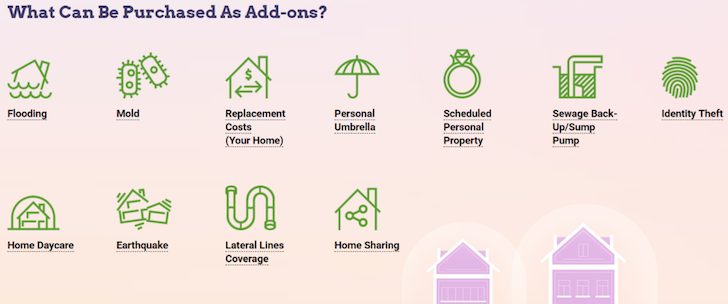
Home Insurance Cost And Deductible
My insurance cost approximately $1,300 annually with a $1,500 deductible. Very affordable.
After this experience I would happily pay $2,000 annually for a higher coverage amount. Nothing is worse then being underinsured after losing a home. Home insurance has by far been the best return on investment I have ever made.
Here is an example of detailed home insurance policy quote comparisons for a $1,000,000 home. You can click the chart to shop around for home insurance with Policygenius.
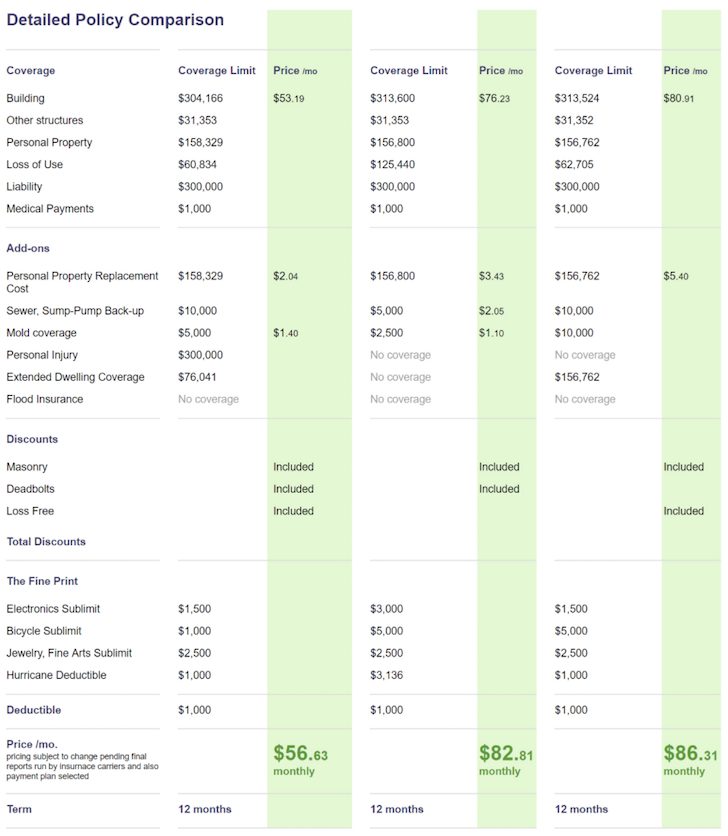
For those of you living in even more expensive cities, here is another home insurance policy quote for a home valued at $5 million. Please beware that some larger insurance companies are not offering new home insurance policies because they have concentration risk. Hence, you will have to shop around.
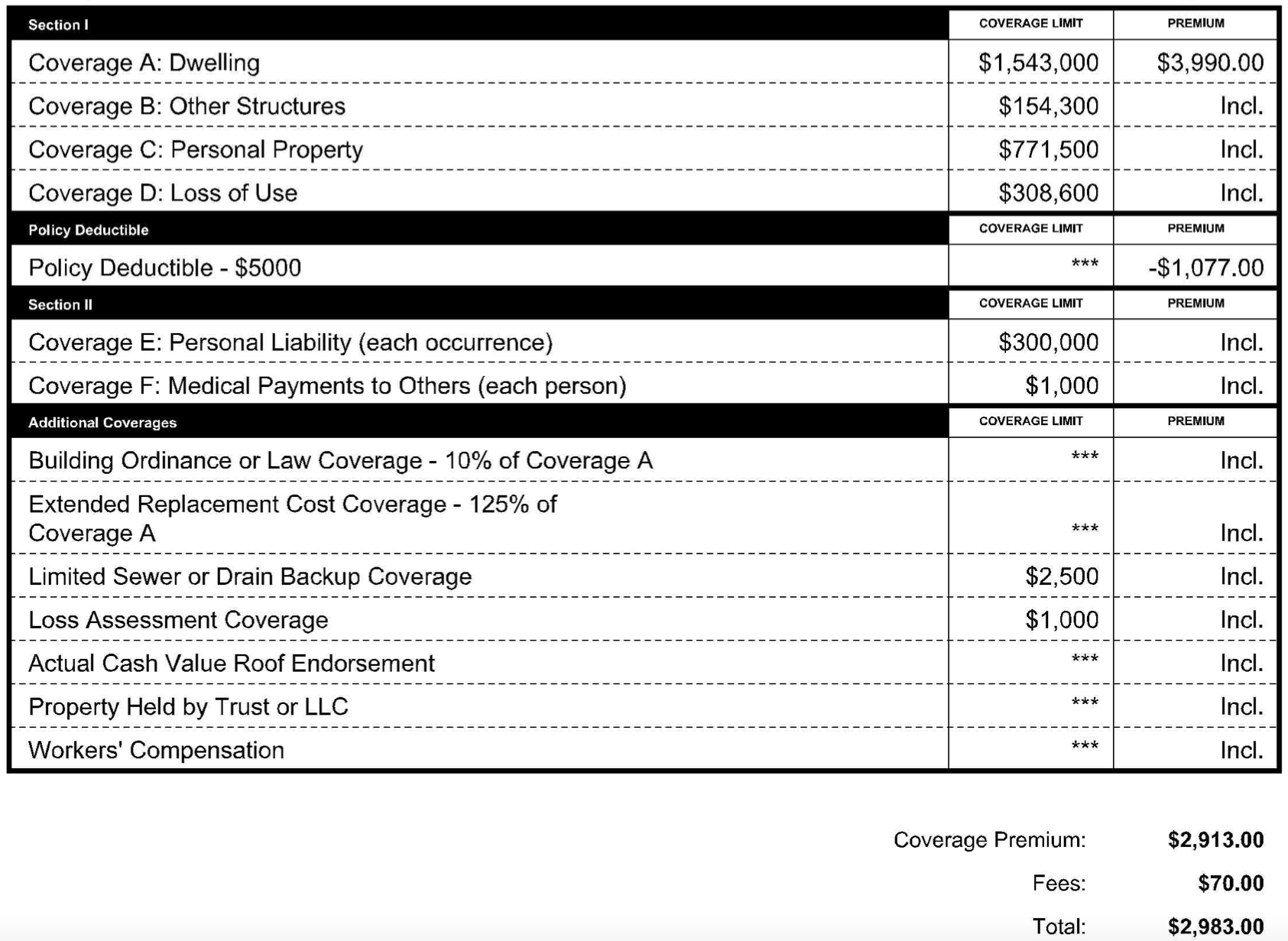
What About Fire Coverage In A Home Insurance Policy?
Finally it is worth noting that I did not have additional fire insurance. I had my regular old home insurance and it covered all of the loss. This is not like an earthquake or flood that needs an additionally purchased insurance policy.
My policy covered the fire whether it was a natural disaster or a house fire. Some of the additional protections I received were due to this being a Federally declared disaster and living in a consumer protection state like California.
But no, I did not need fire insurance.
This is good, because I would never have thought to ask separately for it. In fact, when I went to bed at 1 AM I saw a red glow over the hill and did not even realize it was a fire!
When applying for a homeowners insurance policy always ask if the policy has a fire exclusion or not. If there is no fire exclusion, you’re covered.
Unfortunately, if the policy has a fire exclusion the insurance carrier will not cover damages from fires. You’ll have to get a separate policy specifically for fires.
Total Destruction From A Fire May Be Best, Ironically
If there is going to be a fire though, in many ways it is best to have a complete loss like we did. Total destruction so that the insurance company can not argue about what is salvageable.
My neighbor was not so lucky. His home was still standing between two burnt homes. He had a lot of smoke damage and his house was uninhabitable.
He ended up fighting tooth and nail with the insurance company about his coverage. The insurance company argued everything should be cleaned first. He had two young kids and argued that his home needed to be stripped to the studs.
It was brutal to hear his stories of the back and forth discussions he was having. It was not a fight I wanted to have. He lost everything, but because his home was still standing receives much less support.
I was able to move forward while he remained stuck for months arguing with his insurance company.
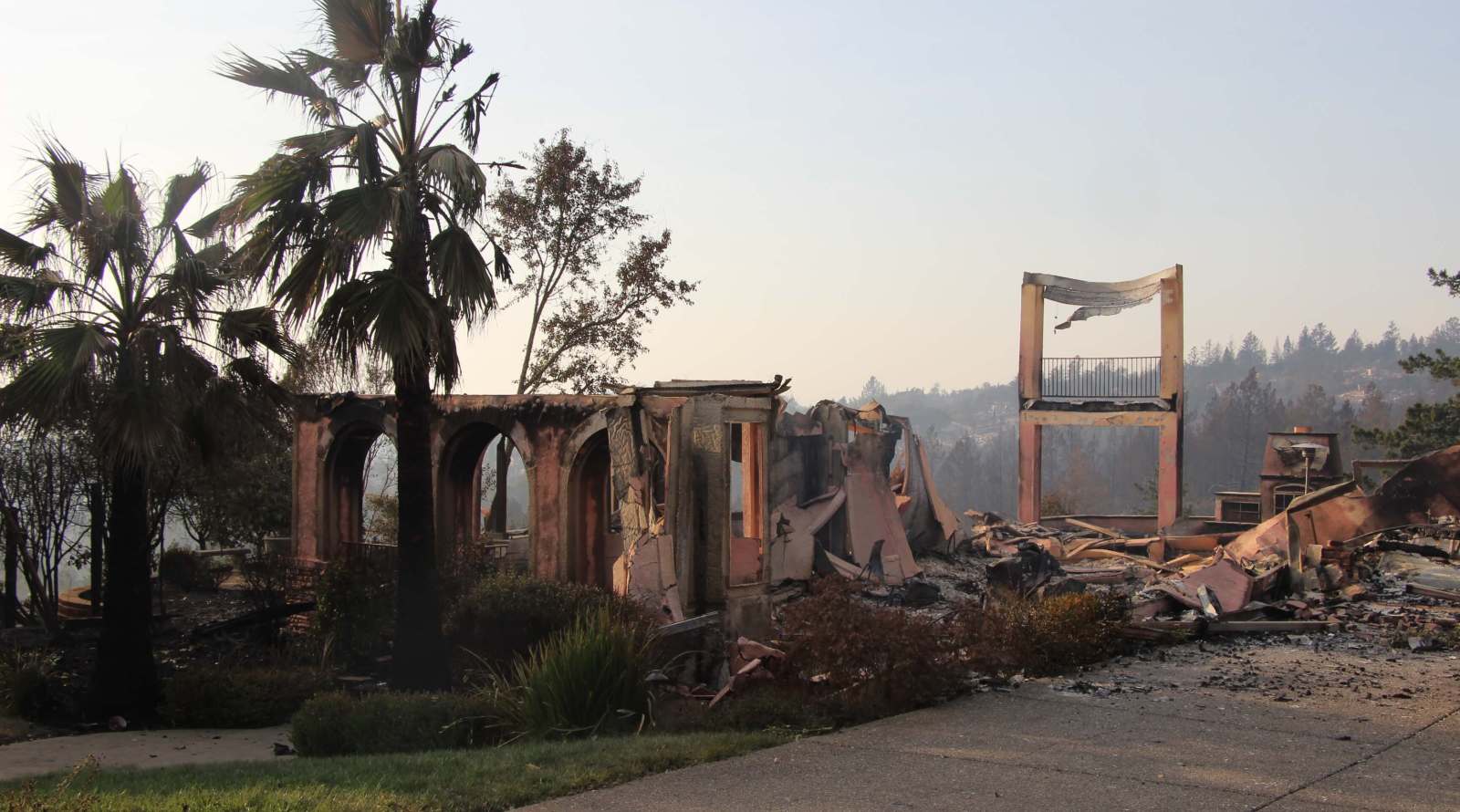
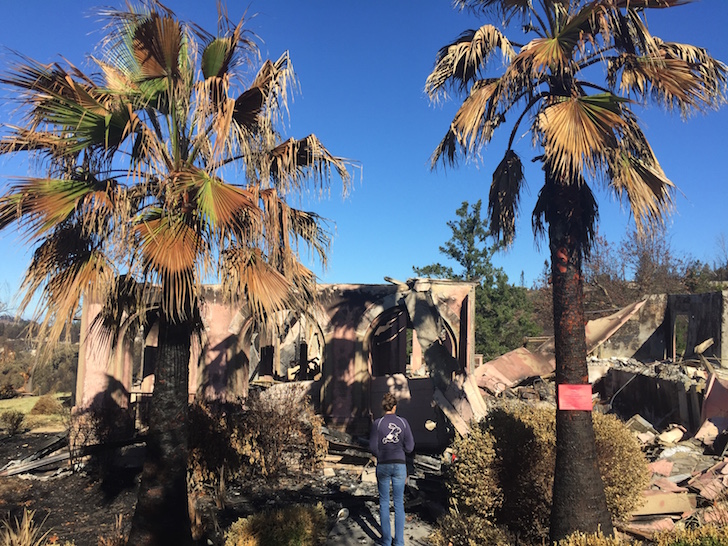
Home Insurance Is A Life Saver
It pays to be well insured. I did not know much about property insurance when I bought my home. In fact, my insurance broker set this policy up for me and has been working with me throughout the home insurance claims process. I never even read the entire policy before this. I was by no means an expert, but now have a lot of first hand experience.
This is what I recommend for all homeowners:
- Call the insurance company and ask for a copy of the full policy. This document should be 50 to 70 pages long.
- Make sure to have an adequate Coverage A (Dwelling) limit. This is the coverage that will dictate all of the other coverages. It should be high enough to cover rebuilding a equivalent home. Make sure the coverage amount is up to date with the current value of your home and latest construction costs.
- Purchase “Replacement Cost” insurance and not “Actual Cash Value” for both Coverage A (Dwelling) and Coverage C (Personal Property).
- Consider an extension for the Coverage A limit or ask if there is one. My extension was for 125%, but other’s have 150%, 175%, or even guaranteed replacement cost. It is worth the small increase in annual cost if ever needed.
- Jump through the hoops that the insurance company lays out. I am impressed by my insurance company thus far. As long as I am doing what they ask, they have been quick and reasonable with payments.
- Photograph and video all personal items and keep the list in a shared spreadsheet.
- Ask if your home insurance policy covers fire insurance or has a fire exclusion. If it has a fire exclusion, then you best shop around for a new policy or add a fire insurance policy.
It Pays To Be Insured And Thorough
There you have it. One man’s experience with insurance after a major fire. May you never go through what I did. But if you do survive and have a good insurance policy, you might end up more appreciative of life and wealthier as a result.
Check Policygenius to get customized life insurance quotes all in one place. Both my wife and I got matching 20-year term policies through Policygenius during the pandemic and feel a tremendous sense of relief as a result. If you have dependents and debt, getting a term life insurance policy is the responsible thing to do.
Listen and subscribe to The Financial Samurai podcast on Apple or Spotify. I interview experts in their respective fields and discuss some of the most interesting topics on this site. Please share, rate, and review!
For more nuanced personal finance content, join 60,000+ others and sign up for the free Financial Samurai newsletter and posts via e-mail. Financial Samurai is one of the largest independently-owned personal finance sites that started in 2009.
Read the full article here












